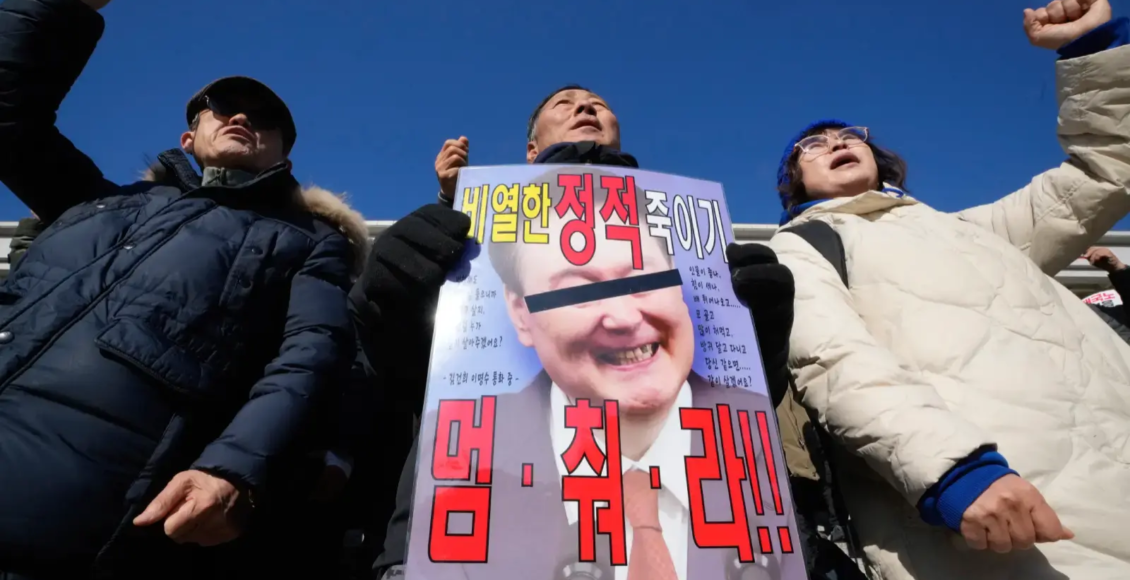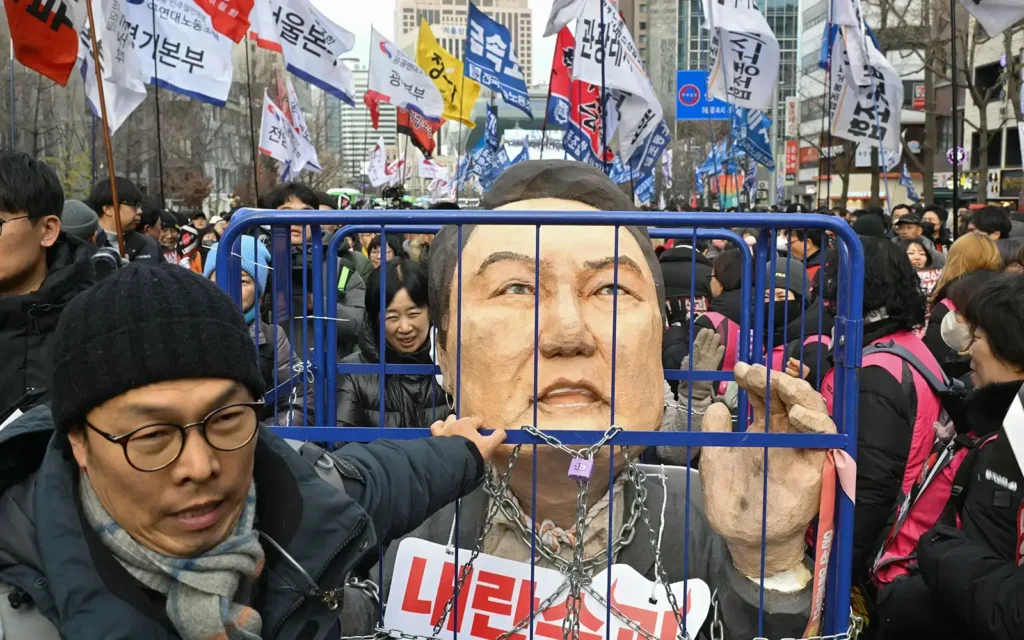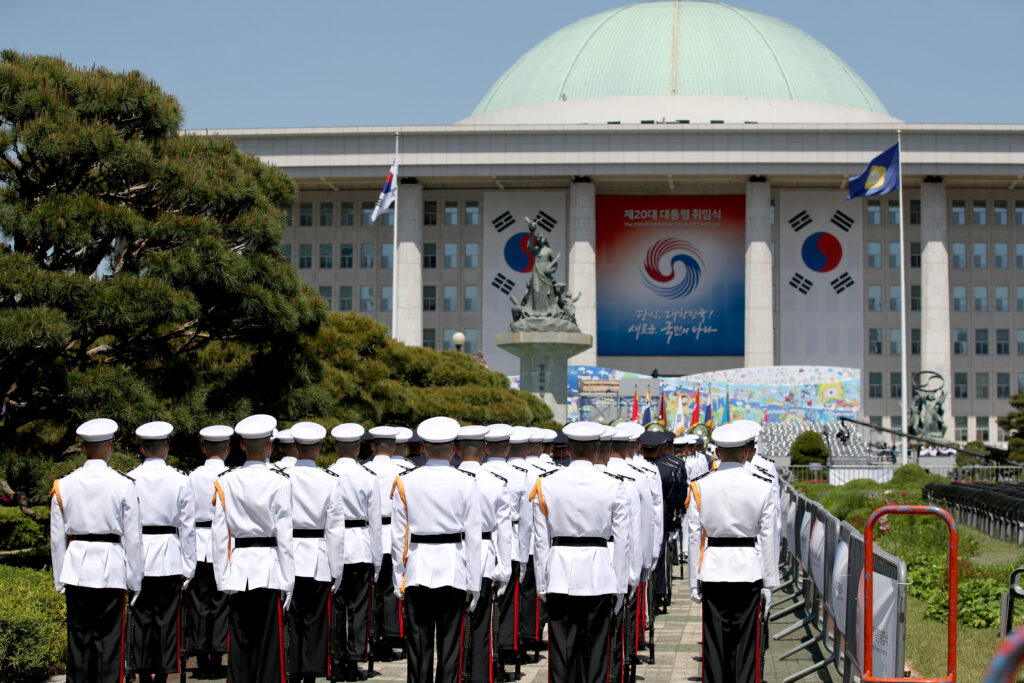Will South Korea Save its Democracy?
 Featured Image: “Members of South Korea’s opposition Democratic Party protest against President Yoon Suk-yeol outside the national assembly in Seoul”, by Free Malaysia Today, published December 4, 2024, is licensed by CC 4.0.
Featured Image: “Members of South Korea’s opposition Democratic Party protest against President Yoon Suk-yeol outside the national assembly in Seoul”, by Free Malaysia Today, published December 4, 2024, is licensed by CC 4.0.
On December 3, South Korea faced yet another test of its democracy–President Yoon Suk-yeol, elected just 2 years ago, declared emergency martial law for the first time in 45 years temporarily granting power to the military. This move sparked mass protests, drawing more than 500,000 people to the streets of Seoul. What followed could mark the end of Yoon’s career. The National Assembly lifted martial law after only 6 hours. Two weeks later, on December 14, Yoon was impeached, and eventually arrested on January 15 and charged with insurrection. The political situation in the country remains unclear–the vice president, Han Duck-soo, who briefly stepped in to replace Yoon, was also impeached and the Ministry of Economy and Finance, Choi Sang-mok, now serves as acting president. Yoon is still awaiting the verdict from the Constitutional Court which will decide whether he will be impeached or restored to power. If found guilty of insurrection, Yoon risks life imprisonment or even the death penalty.
Article 77 of the South Korean Constitution gives the president the right to declare martial law either in times of “war, armed conflict or similar national emergency” to “maintain public safety.” In his national television address on December 3, Yoon defended his decision to declare martial law as a necessary step towards fixing South Korea’s political crisis. He accused the opposition, the Democratic Party of Korea (DPK), of sympathizing with North Korea and aligning with anti-state forces. Yet Yoon’s justification appears constitutionally weak, raising concerns about the legality of his actions.
Critics argue that Yoon’s decision was driven by his political frustration facing strong opposition from the National Assembly, where the DPK holds a majority. Over the past year, tensions have escalated between Yoon’s party, the People Power Party (PPP), and the opposition. The legislature has repeatedly blocked PPP budget plans, while Yoon has vetoed laws passed by the DPK, creating a political deadlock that has made it difficult to govern. Yoon’s wife, Kim Keon-hee, was facing corruption allegations for accepting a luxury bag and for stock price manipulation, which some argue have influenced his decision to declare martial law.
The Constitutional Court should announce its verdict in March. If charged, the Assembly will have 60 days to prepare for an election. Lee Jae-myung, the head of the DPK, is the candidate who is most likely to win. However, new elections won’t solve the ongoing debate between both parties and the persistent polarization among South Koreans.

In the 2022 presidential election, Yoon won the presidency with a thin margin of just 0.73 per cent over his opponent, DPK candidate Lee Jae-myung. This narrow victory has only intensified political divisions, further challenging Yoon’s legitimacy and ability to govern. The battle between party supporters has become much more ideological than political–partisans of the DPK and the PPP often view each other not just as political opponents, but as cultural enemies. Their ideological differences are becoming increasingly irreconcilable, as escalating attacks and accusations fuel instability in the country’s political landscape. Political violence has reinforced the depth of this polarization. In 2006, former president Park Geun-hye was attacked attending a party rally. Last January, Lee Jae-myung was stabbed in the neck in Busan.
Identity politics and the demonization of political opponents are now embedded in South Korean politics. Lee also faced trial on charges of giving illegal favor in real estate and for illegally transferring money to North Korea. At the same time, the DPK has passed investigations on Yoon’s wife’s corruption allegations. These incidents, along with a rising trend of aggression toward political opponents, highlight the growing threat of polarization to democratic stability.

South Korea officially became a democracy in 1987 following mass protests of the June Democracy Movement. Despite celebrating more than three decades of democratic rule, it has experienced many cases of democratic backsliding. Yoon is the third president to be impeached reflecting deeper structural issues within its democracy. In 2004, Roh Moo-hyun was impeached for violating election laws but restored to power, and in 2016, Korea’s first female president, Park Geun-hye was impeached and sentenced for 20 years in prison for her involvement in one of South Korea’s largest corruption scandals.
Many have blamed the South Korean institutional framework for fostering political instability. The Constitution has remained unchanged since 1987 and was criticized for being outdated and concentrating power on the executive. During his presidency, Yoon already showed signs of democratic backsliding. He campaigned on closing the ministry of equal gender rights, silenced journalists, raiding homes and launching defamation suits. He also participated in deepening political polarization and maintained a constant clash with the opposition party (DPK). Besides, the constitution limits the president to a single term, which pressures them to implement their policies rather quickly. This often fosters party competition over cooperation, which has developed into zero-sum games between Yoon in the executive and the legislative, dominated by the DPK.

On February 25, during his final statement at the Constitutional Court, Yoon continued to defend his position as an urgent step to save South Korea against the opposition’s impeachment motions, legislative obstruction, and budgetary gridlock and further insisted that “it was never a personal choice” but rather the only option left to protect the country. Since the martial law declaration, Yoon’s party has suffered a sharp decline in approval ratings. Yet, despite the backlash and concern over his authoritarian tendencies, his supporters continue to rally behind him, taking the streets in his defense, reflecting the entrenched identity politics that continue to shape South Korean elections.
President Yoon’s declaration of martial law has brought the country to a breaking point exposing the growing political divide fueled by partisan rivalry, with politicians more focused on party rivalry rather than addressing pressing issues such as widening economic inequality and low birth rates. The incident also reveals constitutional loopholes that allow for democratic backsliding. What comes next will depend on the final court decision to impeach or reinstate Yoon. However, another election without addressing South Korea’s deep rooted political polarization and structural flaws is unlikely to save its democracy or to restore its stability.
Featured Image: “Members of South Korea’s opposition Democratic Party protest against President Yoon Suk-yeol outside the national assembly in Seoul”, by Free Malaysia Today, published December 4, 2024, is licensed by CC 4.0
Edited by Hannah Lalonde
